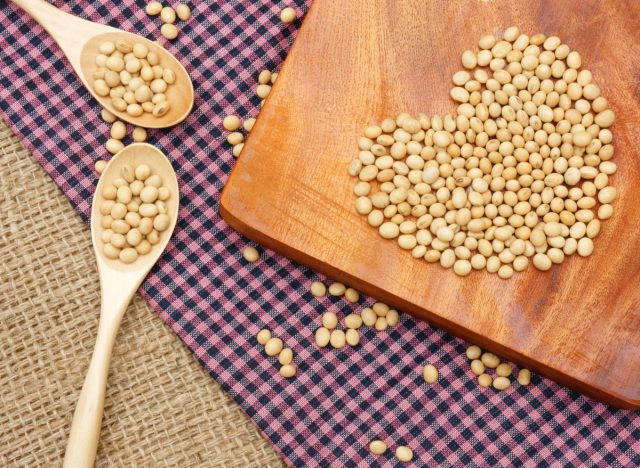The #1 Snack to Boost Your Heart Health, Study Suggests

Most of us know the basics about how our diet can impact our heart health.
For instance, if you’re eating deep-fried foods for every meal, your ticker could be at risk, while if you eat a varied and nutritious diet with plenty of whole, unprocessed foods, you’re probably better off.
Yet, scientists are still figuring out some of the finer points of how the foods we eat impact our cardiovascular health. Now, a new study finds that eating soy could help lower your risk of heart disease.

In the study, published in the journal Clinical Nutrition, researchers from the Department of Nutrition and Movement Sciences at Maastricht University in the Netherlands examined a group of 23 healthy older adults, ages 60-70 over a period of about four months.
After supplementing some of these participants’ diets with soy nuts, the researchers found that they tended to have lower levels of certain cardiometabolic risk markers including less LDL (“bad”) cholesterol and arterial pressure.
Granted, there are reasons to take this study’s findings with a grain of salt.
“This particular study was funded by Alpro Foundation, an organization supporting research studies on plant-based diet,” Jennifer Maeng, MS, RD, CDN, LD, CNSC, registered dietitian at supplement company Twinlab, tells Eat This, Not That! in an interview. “This clinical trial also had a very small sample size… Lastly, depending on the type of soy, it can have different effects on health due to its composition.”
She added that the improvements to participants’ blood vessels could have other causes, like those people could be getting more fiber or vitamins and minerals. On the other hand, she cautioned that everyone’s body is different, and someone who, say, has altered hormone levels could actually be harmed by eating too much soy.
“When it comes to cardiovascular health, it is important to consider diet, genetics, and lifestyle factors rather than focusing on a single food,” she says. “If you are trying to pay more attention to your cardiovascular health, eating less processed foods and focusing on a more wholesome [and varied] diet, … and staying more active … could be a good place to start.”
You can try getting your 150 minutes of moderate-intensity activity and two days of muscle-strengthening exercise each week recommended by the U.S. Department of Health and Human Services’ Physical Activity Guidelines for Americans. As far as diet, seeing what feels right for your body is a good place to start.
For more dietary changes that could have a positive effect on your heart health, check out these Eating Habits to Lower Your Heart Disease Risk, Says Dietitian.









